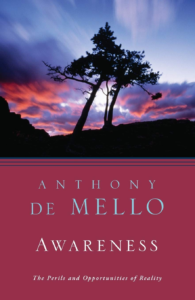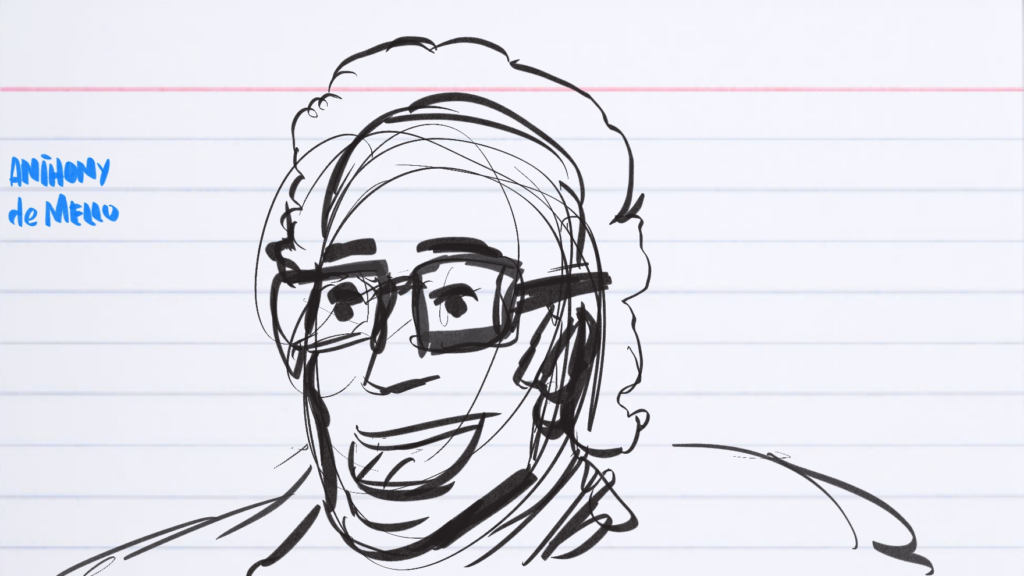
Check out the full notes for “Awareness” by Anthony de Mello
I picked up Awareness: The Perils and Opportunities of Reality up after hearing it mentioned on Tim Ferriss’s podcast. Actually it was the second time I heard it mentioned that got me to pick it up.
Here’s what Ferriss says about it (in the Tobi Lütke episode around 1:24:10)
It was recommended by a guest on this podcast, Peter Mallouk, who’s in finance. I decided to pick it up because he said every time he re-reads it, and he re-reads it more than any other book, it gives him an extended sense of peace.
And I was like, that’s an interesting… that is not the phrase or explanation that I would expect. (Lütke: That’s a hell of a way to sell a book.)
Peter Mallouk says it’s the book he’s gifted the most. He also told a quick anecdote. He’s worked with a bunch of older people with more money than most people would even imagine having. And they don’t want to spend it. Or they don’t want to enjoy it. They can enjoy it and still have way more than enough to leave to their children and grandchildren.
Here’s Mallouk talking about Awareness (around 1:27:24):
To me, what it basically said was: No matter how good things are, they’re not that good. No matter how bad things are, they’re not that bad. That almost everything you’re experiencing with other people is about the other people—it has very little to do with you. People don’t think about you as much as you think they do.
I think it’s just a very… it’s a book that gives you a lot of perspective about yourself in the world. I think if you read it at the right time in your life—for me, it brought a lot of peace. I’ve read the book a few times. So I love that book.
Tim Ferriss often mentions that he knows plenty of millionaires and billionaires who are unhappy. And the world is filled with people who think that if they had a million dollars, they’d be much happier.
As much as I’d like to be a person who knows that isn’t true, I’d be lying if I said I never think “I wish I had more money, that sure would make me happier!”
Mallouk recommends Awareness for being a great guide in finding happiness in yourself.
Money is only at the surface. Anthony de Mello goes further than not needing money to be happy. You don’t need things to make you happy. You don’t need success to make you happy. Or experiences. Or religion. Or other people. It’s in you.
And now to hold two opposing ideas in my head without it exploding. I’m pretty convinced that happiness shouldn’t be dependent on external factors. At the same time, I’m pretty convinced that happiness is other people. Spending time with people you love. (And, you know, not checking your phone while you’re at it.)
Here are some of my highlights.
“That’s the eagle, the king of the birds,” said his neighbor. “He belongs to the sky. We belong to the earth—we’re chickens.” So the eagle lived and died a chicken, for that’s what he thought he was.
The marshmallow study, the good samaritan study, the thing where the ceramics teacher asks half the students to make as many pots as possible and the other students to focus on making one best pot, the 10,000 hour rule, that story where you start with a jar and fill it with sand and pebbles and rocks…
None of those are in here. It was refreshing for me and another reminder that I need to make an effort to read books outside of business and self-development.
Awareness has a parables from other cultures, and it was my first time hearing a lot of them.
What do you think you are? You might be an eagle.
There’s a lovely saying of Tranxu, a great Chinese sage, that I took the trouble to learn by heart. It goes: “When the archer shoots for no particular prize, he has all his skills; when he shoots to win a brass buckle, he is already nervous; when he shoots for a gold prize, he goes blind, sees two targets, and is out of his mind. His skill has not changed, but the prize divides him. He cares! He thinks more of winning than of shooting, and the need to win drains him of power.”
I added a note here because it reminded me of an episode of Brian Koppelman’s podcast. (This is the Steven Pressfield episode of “The Moment” around 55:53) He talks about this discussion he has with his son about pressure and free throws. Chris Bosh is on the Billions set so they ask him: If your life depended on someone making a free throw, who would you pick to take the free throw?
Bosh’s answer: Ray Allen.
Great choice. Now the best part: Would you tell Ray Allen your life depends on it?
Here’s another story from Awareness:
A woman told me her son had gotten an award at his high school. It was for excellence in sports and academics. She was happy for him, but was almost tempted to say to him, “Don’t glory in that award, because it’s setting you up for the time when you can’t perform as well.” She was in a dilemma: how to prevent his future disillusionment without bursting his bubble now.
This reminded me of Justin Kan’s interview on “This Week in Startups” with Jason Calacanis. Plenty of people want to have successful startups. Justin Kan has had plenty of successful startups.
He’s also been part of failed startups. He knows success and failure and has the perspective to say that success doesn’t automatically turn into happiness.
Plenty of people say that, but I liked what he added: sometimes success does lead to happiness and that’s why you need to be careful.
The dangerous part is having a little bit of success and feeling happiness because of it. Then you start to think bigger success will lead to even more happiness. (Around 1:10:45)
I think that’s right. People struggle with the abundance and then they don’t know what to do. Because there’s no more goal. There’s no more carrot, right? Or you can set a bigger one but then you realize, “Oh I got this one and I’m not any happier.”
So what happened? That’s the promise of America is like oh you do this thing and you get this big cookie or whatever and then boom you’re happy. Then you get it and you eat it and you’re like “I’m not any happier. What happened?”
So you can… people go two ways, right? You set a bigger goal or you realize there’s something else. There’s another axis I have to optimize for.
And then there’s never enough.
So maybe it’s okay to aim for calmness.
From Awareness:
The other situation was when she was driving in traffic, with horns blowing and people shouting four-letter words. She asked me whether eventually that nervousness would dissipate and she could remain at peace. Did you pick up the attachment there? Peace. Her attachment to peace and calm. She was saying, “Unless I’m peaceful, I won’t be happy.” Did it ever occur to you that you could be happy in tension?”
Okay, maybe attaching your happiness to calmness isn’t the answer either.
I recently read Peter Thiel’s Zero to One and he talks about a question he’s known for: “What important truth do very few people agree with you on?”
Anyway, I like thinking about the sort of related but less profound “What have you changed your mind about in the past year?”
Then it can be good to figure out what made you change your mind. One of the most powerful things books can do is change your mind about something.
Can’t Hurt Me and The Upside of Stress changed my mind after reading them around the start of the year. Before reading those books, I thought aiming for as little stress in the day as possible was a good idea. At the same time, I was thinking that I didn’t grow as much as I wanted in the past year (and more).
Now, I’m not saying that I’m aiming for as much stress in the day as possible, either. But I’ve been looking at pushing myself a little more this year. Looking for the right stress to grow in the ways that I want.
That’s what will make me more successful.
Then people will think, “Wow, he’s so cool.”
Leading to more happiness.
(Maybe not.)
